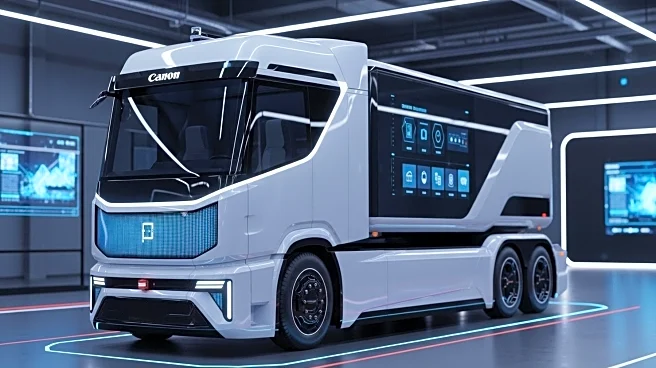What's Happening?
Roush Industries has successfully delivered the first Kodiak Driver-equipped autonomous truck to Atlas Energy Solutions. This delivery marks a significant milestone in the partnership between Kodiak Robotics, a provider of AI-powered autonomous vehicle technology, and Roush Industries, a product development supplier. The truck was upfitted at Roush's Livonia, Michigan facility with Kodiak's advanced AI-powered autonomous driving system. Atlas Energy Solutions began receiving these trucks in December 2024 and has since launched driverless operations in the Permian Basin. To date, Atlas has received eight Kodiak-powered driverless trucks as part of an initial 100 truck order. The partnership aims to transform the freight and logistics market at scale, with plans to scale production into hundreds of trucks by the end of 2026.
Why It's Important?
The delivery of Kodiak Driver-equipped trucks represents a significant advancement in autonomous vehicle technology within the freight industry. This development is poised to revolutionize logistics by enhancing efficiency and reducing reliance on human drivers. The collaboration between Kodiak Robotics and Roush Industries highlights the growing trend of integrating AI into commercial transportation, potentially leading to cost savings and increased safety. As the trucking industry is a critical component of the U.S. economy, these advancements could have far-reaching impacts on supply chain operations and the broader logistics sector. The move towards autonomous trucks also aligns with efforts to address driver shortages and improve operational sustainability.
What's Next?
Kodiak Robotics plans to go public through a business combination with Ares Acquisition Corporation II, with a shareholder vote scheduled for September 23, 2025. If approved, the combined company will list its common stock and public warrants on the Nasdaq Stock Market under the symbols 'KDK' and 'KDKRW' starting September 25, 2025. This public listing is expected to accelerate Kodiak's market strategy, meet increasing customer demand, and position the company to capture a significant share of the trucking industry's estimated $4+ trillion global market. The success of this initiative could further drive innovation and adoption of autonomous technology in commercial transportation.
Beyond the Headlines
The integration of autonomous technology in trucking raises important ethical and regulatory considerations. As these vehicles become more prevalent, questions regarding safety standards, liability in case of accidents, and the impact on employment for truck drivers will need to be addressed. Additionally, the environmental benefits of autonomous trucks, such as reduced emissions and improved fuel efficiency, could contribute to broader sustainability goals. The long-term implications of this shift may also influence urban planning and infrastructure development to accommodate autonomous vehicles.










